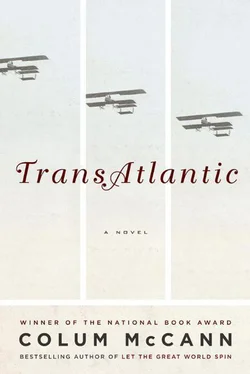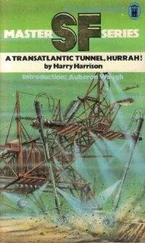The water had come halfway up my Wellingtons. It was too cold to swim, though at seventy-two years of age I still like, on occasion, to pull on a ratty wetsuit and take to the water. I remained another hour, watching the geese, until the rock was as good as submerged and my big unwieldy bottom was freezing even through the tail end of my coat. I hailed my dead son and promised him that I wouldn’t let the bank take a single blade of grass or drop of water or broken slate of roof. I rose, stiff with sentiment, and hurried back to the cottage where Georgie waited for me. I fed her some beef, then built the fire with peat and logs, and read a selection of Longley poems.
In the afternoon I prepared a small glass of hot brandy with cloves but I knew myself too well to begin that early, and threw it in the fire where the cloves sizzled. I took the letter from the pantry, propped it up on the mantelpiece where it stood with all the other testaments of flight: photographs and bank demands and a ticking clock.
AN ANCIENT STORY: they desire my land. Five acres of island in an inlet of one hundred other islands. A large cottage, one boathouse, one fisherman’s hut, one dilapidated kennel that my gone husband, Lawrence, built. The island was a working farm, bird dogs and bloodhounds, and for a while it was used for duck hunting, but not a single shot has sounded across the land since our Tomas died.
I can walk the land and still find old cartridges and pellet packages and the skulls of birds that fell from the sky. The trajectory of a shot bird is an incredible thing. Caught hard in the air, the sky continues to move behind, but the bird drops straight down, a plumb line of descent. A thump on the ground, a splash in the mudflats or out on the waves. And then the delight of the dogs skelping through the grass or over the water.
We had eight dogs at the best of times. There is only Georgie now, faithful old Labrador. She, too, is a little heavy on her paws but can still raise a ruckus when a mallard appears.
Just across the bridge there are monastic ruins ten times as old as my precious letter. A heritage site. Brass plates and stone stiles and climbing moss. The holy books were written here fifteen hundred years ago. Ink from the land. Parchment from cattle.
Not many visitors come down these narrow back roads to the edge of the lough, but I am still curmudgeonly enough to swing a stick if they stray past the ruins and come across the bridge, up the mudflats, towards the cottage.
Three bedrooms, a large kitchen, a living room, a pantry, and a new sunroom built in the 1980s, built under the supervision of my mother, as if we could get all that war out of us by looking to the water. The sunroom is high and wide and full of light. A wooden bench along the windows. Pillows patterned with Admiralty charts. The rest of the cottage was built low to keep us humble. Rump-sprung chairs and faded upholstery. A smoke-charred fireplace. A formal bookcase of mahogany and glass. My son used to have to stoop through the doorways. The walls are built thick, but there’s a cold that enters the belly of the cottage and remains. All the doors have to be closed to seal the heat from the fire in the main room. Give me any sort of light: preferably tilleys, storm lanterns, the blackened glass of Victorian lamps.
Shells fall on the roof constantly from the birds overhead. There are times I feel I am living inside a percussion instrument.
AT THE FIRST gesture of dawn, I pulled on the walking gear, grabbed Georgie and took her around the edge of the lough, along the shore, through the damp woods at the back of the ruins. Green boughs on each side and moss soft underfoot. A stone stile in the wall.
She balked at a tangle of underbrush and barked at the shadows of windblown trees scuppering through the ruins. Her ears high, her back arched. The ancient monks used reeds to paint the gospels. Cowhide and wolfskin and the pelt of elk to keep out the weather. They ground down bone, mixed it with grass and soil and berries and plants. Bird quills. Leather bindings. Stone huts. Bronze bells. A series of walls for defense. Round towers for lookout. The fires they lit were small. The books they wrote were taken then across the lough, across the sea, to Scotland.
A female curlew comes to visit these parts sometimes, sailing over the cottage. The mottled gray and brown of her plumage. Her long slender beak looks like a scissors moving across the sky, following her call, snipping through its solitary grief. I like to catch her through the binoculars, in the mudflats, pecking at the earthworms that come up from down below, though I haven’t heard her for quite a while now.
I walked through the ruins of the chapel at the nape of the hill, and picked up the cider cans left by youngsters in the village. Raves , I think they call them. They might as well. Better here than some foul little bedroom in a council estate. There were remnants of cigarette butts scattered all about, plastic sleeves, bottle caps, soggy boxes. I left the condoms for another day. Two forlorn little curlicues in the gravel. She loves me, she loves me not .
By the ruins of the chapel the wrapper of a chocolate bar sparred against the wind and an empty wine bottle completed the romance.
It was all enormously still and silent until a flock of new geese flew in their high patterns from the lough over the air. They made a noise close to rifle fire, and Georgie leaped up along the wall as if she could catch them in midair.
I dumped the litter in the rubbish cans near the heritage signs, crossed back over the bridge, circled around the island. A one-hour walk. Old woman and her dog. Georgie loped on ahead, flushing birds from the long grass. Broken lobster pots were strewn on a sandy patch near the water. The edges of the lough are never watertight, either to the land or the sea. The tides flow in and out. Boats and memory, too.
The phone was ringing by the time I got home. I pushed open the half-door, dropped the leash, walked through the low rooms, stood over the answering machine in the kitchen. The infernal red blinking as he spoke. Simon Leogue, the bank manager in Bangor, again. So polite and poised, a southern accent laced with some London, all our troubles in one voice. Good morning, Mrs. Carson . A fine young man if he wasn’t what he was, but he is.
The only way to erase a message is to listen to it first. The thought of listening twice was far too much for me, so I picked it up and let it drop midsentence, then yanked the plug from the wall. A brief and merciful silence. It was hardly the smartest move, though I have the BlackBerry in case of emergency.
I brought Georgie out the back to the sunroom. The geese formed against the changing sky. The tides beneath it can carry a body swiftly out to sea. Slewter, slaughter, holy water.
THEY SHOT TOMAS as he pulled up his boat to shore in October of 1978. Nineteen years old. Still in university, his second year, advanced probability. I am still not certain whether it was UVF or IRA or UFF or INLA or whatever other species of idiot was around at the time. In truth, I have a fair idea, but it hardly matters anymore. Our ancient hatreds don’t deserve capital letters.
They shot him for a bird gun. Within hearing range of the cottage in the dark of early morning so that my mother rushed into my bedroom and said: That’s odd, Hannah, darling, did you hear that? Already Lawrence was running across the lawn, ice cracking under his feet, saying, Oh, my God, Tomas, oh, my God. We were sure at first he had shot himself, but it was three shots. He was out early, setting the decoys.
The current took him a long way from us before we caught him, down near the Narrows where he was spinning in relentlessly smaller circles. It’s hardly wisdom, but the older I get the more I believe that our lives are built not out of time, but light. The problem is that the images that so often return to me are seldom those I want. The water was silver and black. The wind whipped cold. We waded through the shallows to get him. The boat still circling. A silver light rippled alongside us. His donkey jacket. Wading boots. Binoculars around his neck. So very young. He didn’t look shot at all, just slumped over. Some frost on his eyebrows. I will never forget that. A little rime of white collecting there. One hand clenched in anger, the other open and limp. Lawrence reached into the boat and took him in his arms. He carried him to shore where the uniforms came running. Cursing their way through the shallows. Drop him, a voice said. Now. Drop him. Spotlights on the shore, though it was full morning. Sirens sounding. My own mother on the shore with her hand to her mouth. In her housecoat. Someone put a blanket around her shoulders. Her silence. Lawrence laid down my son at the edge of the reeds. The newspapers made it ever so simple: a young man out armed with a gun, besieged by men out armed with more guns. How far from real the truth is. I wanted then to take every murdering bastard in Northern Ireland, and have them sleep for a night in my boy’s blue rowboat, out on the lough, in the dark, among the reeds, turning in primal celtic patterns.
Читать дальше












